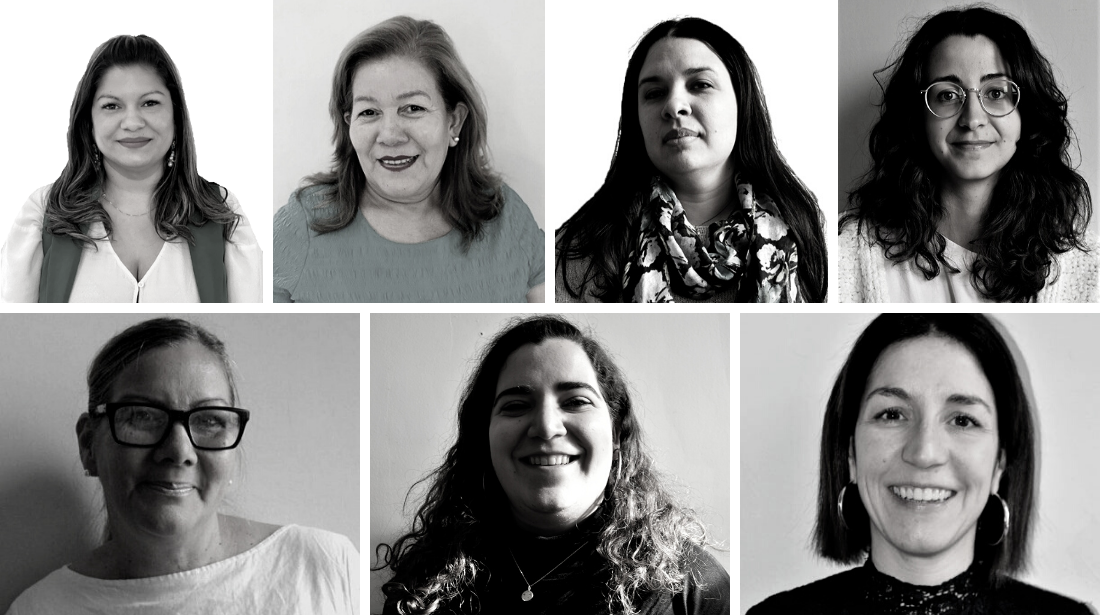
To celebrate the International Women’s Day, we highlighted the dedication of our female experts and employees to the fostering and promoting children’s rights worldwide. Today, we are taking the time to appreciate the broad scope of their experience and their background, which reflects the diversity within the IBCR.
“Each for equal” was the global theme chosen for IWD 2020. Because equality is an issue that is at the heart of our work, we called attention to the action of our female coworkers towards a fairer world for their fellow women. Discover the portraits and thoughts of some of these committed women which we have shared in a special social media campaign throughout the week.
Get to know them in three questions:
- What is your role in the IBCR ?
- This year we are celebrating the 25th anniversary of the Beijing Declaration and Platform for Action which promotes gender equality and the empowerment of women and girls around the world, in your opinion, has any progress been made on this issue in your home country? If so, what progress has been made?
- Given your background, what message would you deliver to the young girl you were?
Each of them shared with us their perceptions of the evolution of women’s and girls’ rights in today’s communities, particularly in their countries of origin.

Cecile Bettega
- I am the Communications and Public Engagement Coordinator.
- I have the feeling that change is happening in France, there is an raise of awareness about the inequalities that affect women and girls, even in everyday life. Even if much remains to be done, there has been a liberation of the speech in recent years, which has made it possible to tackle real societal problems, such as street harassment, sexual, family or conjugal violence or even ordinary sexism, which are still very present in a very paternalistic and macho French society. I hope that this movement will carry on and lead to real gender equality in France, but I think that we are on the right path and that future generations of leaders will be very committed to this issue, at least I believe in it!
- I would tell her to believe in her intuition, always, and always fight for what she believes in and thinks right.
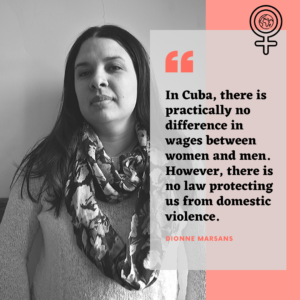
Dionne Marsans
- I’m a financial support specialist at the headquarters in Montreal.
- In Cuba, in my country of origin, there is practically no wage discrimination or difference in access to education between women and men. However, when it comes to domestic violence, there is still a very long way to go because there is no law to protect us.
- I would tell my younger self the same thing that I repeat to my 8-year-old daughter every day and that my mother told me: you are capable of doing whatever you want, never let yourself be verbally and physically abused by anyone, never. If a man loves you, he loves you for who you are and will never ask you to change to please him.

Julie Dénommée
- I am the Monitoring, Evaluation, Learning and Accountability Coordinator.
- When I travel, I am often surprised to realise that I come from a society where being a woman has never seemed to be a hindrance to what I wanted to accomplish. And yet, in recent years, I feel a return to the pendulum where women’s rights, especially some women’s rights, are increasingly threatened.
- I would tell the younger girl in me to continue to believe in her abilities and goals, to dare to speak up and not let them be imposed.
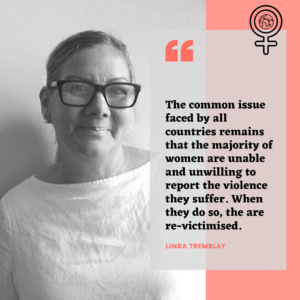
Linda Tremblay
- I’m an expert on violence and children.
- Progress has been made, particularly regarding violence in Latin America. The third generation of laws on this subject has been introduced in Peru. I will not say that there is less violence, but there is less hidden violence. Women are staying in toxic and violent relationships for a shorter period of time. In Quebec, we have been on the right track for some time. There have been plans against sexual and domestic violence, including ministerial plans that have led to breakthroughs and better funding. Feminist movements are now extremely well organised. However, in Quebec, there is no law against conjugal violence, whereas in Latin America it has existed since 1995. Overall, since the Beijing Platform for Action, I would say that progress has been made on the rights of women and girls around the world. The problem common to all countries is that the vast majority of women are unable and unwilling to denounce the violence they suffer. When this is the case, their complaints are not dealt with properly, they are re-victimised most of the time.
- I message I would tell myself is be patient, it is a long-term struggle that requires constant vigilance. Indeed, I have been campaigning for the defense of women and girls who are victims of violence for 40 years now and I have continued to do so. There have been advances and setbacks, but it is not something that can be resolved like that. You have to be patient and celebrate every small victory.
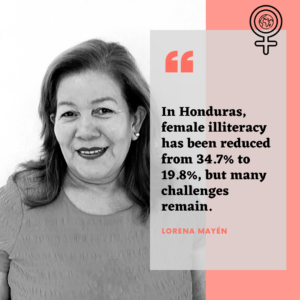
Lorena Mayén
- I’m a social work expert specialised in human trafficking in our satellite office in Honduras.
- In light of the Beijing Platform for Action in Honduras, there has been a lot of progress. Indeed, we have strengthened the legal framework that guarantees women’s rights and a national women’s policy has been defined. It is reflected in various action plans and, to date, we are drawing up the third PIEG (Program for Gender Equality and Equity) . Thus, laws against domestic violence and for equal opportunities have been adopted and the National Women’s Institute has been established. In addition, inequality of access to education had been reduced, in particular through the introduction of the third cycle of basic education, and female illiteracy had been reduced from 34.7 per cent to 19.8 per cent. Nevertheless, many challenges remain, such as reducing gender-based violence and high rates of feminicide and continuing the struggle for women’s economic autonomy.
- I would say to her, congratulations, you have achieved your goals! Keep working for the common good, you are doing very well!

Patricia Hajjali
- I’m an assistant to the director-general.
- Although there has been progress on the status of women in Lebanon, much remains to be done in terms of legislation and perception. In some legislative texts, Lebanese women are still considered economically and socially bound to their husbands. Moreover, the confessional system ensures that legislation changes from one religious court to another. I remain optimistic, however, as women have been at the forefront of the Lebanese revolution since 21st October 2019.
- If I had a message for the young girl I was, it would be as follows: “When you grow up, you will realise how lucky you are to grow up surrounded by women who are just as different from each other, but so strong. They will all mark you in one way or another and make you the woman you are today.
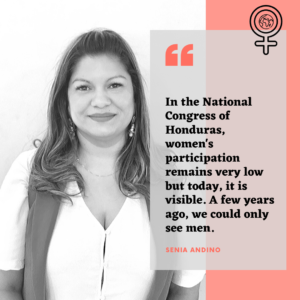
Senia Andino
- I’m a legal expert at our satellite office in Honduras.
- Progress on women’s participation remains minimal. Indeed, although women are coming together and uniting their voices to claim their rights, most of the groups they form are being reported and challenged. At the National Congress of Honduras, women’s participation remains very low, but still visible. A few years ago it was only men. Although external cooperation has implemented projects aimed at mainstreaming the gender approach, the rates of violence against women have increased.
- I would tell myself: You are a woman, a synonym of great value. You are capable, respectable, strong and not the weaker sex. It will be difficult, but you will succeed because you are a woman. You might think that you don’t deserve your success, that it should be someone else’s job to achieve great things but you deserve everything. You’re worth it.





